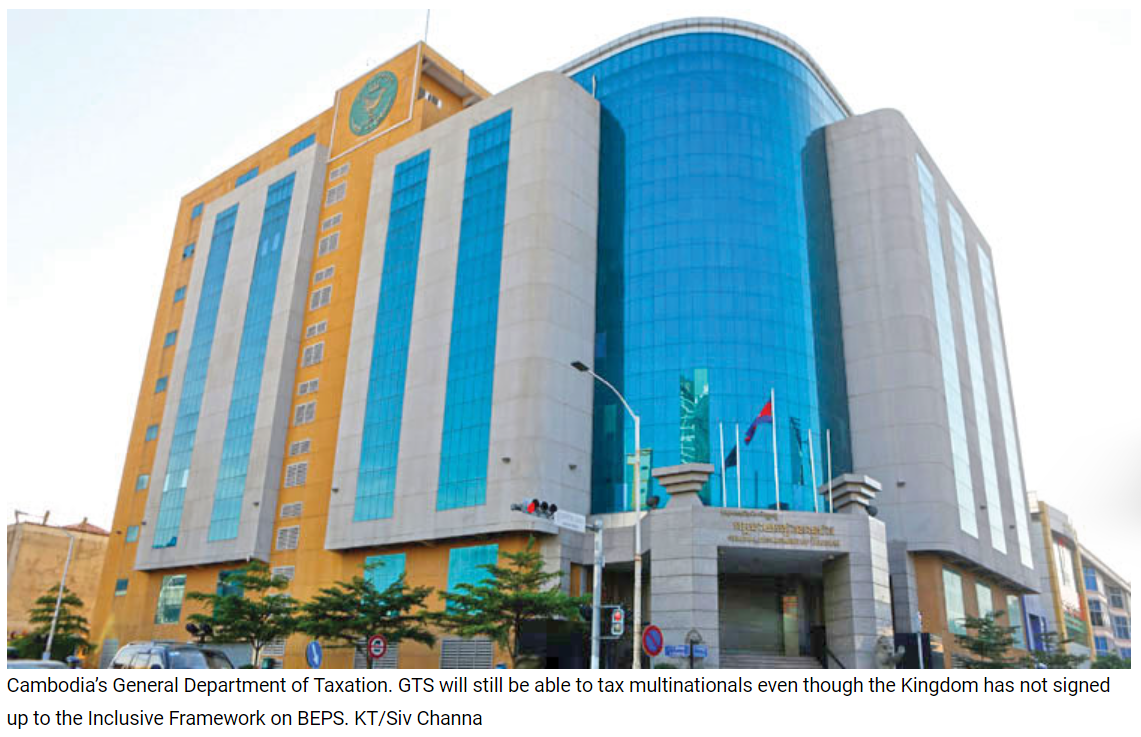Cambodia: Multinationals face taxes in non BEPs countries, experts say
Multinationals making money in Cambodia without a physical presence here will not be able to avoid paying taxes, even though the Kingdom has not signed up to the OECD/G20 Inclusive Framework on Base Erosion and Profit Shifting (BEPS), according to tax experts.
G20 leaders endorsed the new international tax reforms proposed last month at their weekend summit in Rome.
Some 136 countries will participate in the agreement, including some previously reluctant economies such as Estonia, Hungary and Ireland. That means the agreement is now supported by all OECD and G20 countries. Only four countries within the 140-member OECD/G20 Inclusive Framework are holding out: Nigeria, Pakistan, Kenya and Sri Lanka.
“The participation of major advanced and developing economies is a key enabler to implementing the global tax reform,” said the ASEAN+3 Macroeconomic Research Office (AMRO) in a report this week. “The participation of a significant number of emerging and developing economies, including China and India, augurs well for the implementation of these reforms globally. Some ASEAN+3 economies, such as Indonesia, have made early preparations in anticipation of the upcoming reforms. Indonesia approved the enactment of the Harmonized Tax Law in early-October with the aim to optimise tax revenue collection,” it said.
Clint O’Connell, Partner and Head of Cambodia Tax & Customs Practice at DFDL Cambodia, called it a monumental agreement.
“Countries can now legislate a minimum rate of at least 15 percent for large companies with annual revenues over $864 million so if a company’s earnings go untaxed or lightly taxed in one of the world’s tax havens, their home country would impose a top-up tax that would bring the rate to 15 percent,” he explained.
“The plan also lets countries tax part of the earnings of the 100 or so biggest multinationals when they do business in places where they have no physical presence, such as through internet retailing or advertising. The tax would only apply to a portion of profits above a profit margin of 10 percent,” O’Connell said.
Withing the ASEAN+3 region, which includes the 10 members of the Association of Southeast-Asian Nations, along with China, Japan and South Korea, home countries of multinational enterprises (MNEs) that have a large global presence could see some reduction in tax collection, according to AMRO.
“Given greater clarity on the implementation of two-pillar reforms, potential effects on some regional MNEs and government revenue have been highlighted in news articles. For example, Samsung Electronics and SK Hynix, which reported revenue of $198 billion and $26 billion in 2020, respectively, are likely to be in-scope MNEs. This means that some of their corporate profit taxes to the Korean government will be shifted to foreign governments according to Pillar I. However, the Korean government has thus far assessed that the total impact on its government revenue would likely be a net positive, as higher collectible taxes from companies operating in Korea are expected. The government has also emphasised that it will look into measures to mitigate the impact of the global tax reform on Korean companies,” it said.
Cambodia is a non-BEPS associate member and has not signed up to the OECD Inclusive Framework on BEPS but is still likely to be able to earn revenue from MNEs.
“Cambodia is not immune from the consequences of tax erosion created by the growth of e-commerce in recent times and with the introduction of Sub-decree No. 65 and Prakas 542 this year requiring non-resident
e-commerce providers to register for VAT and the expansion of the definition of a Permanent Establishment in the 2020 Prakas on Tax on Income – the government has paved the way for the tax authority to tax large multinational entities that do not have a brick and mortar presence in Cambodia,” O’Connell said.
Source: https://www.khmertimeskh.com/50963735/multinationals-face-taxes-in-non-beps-countries-experts-say/


 English
English




